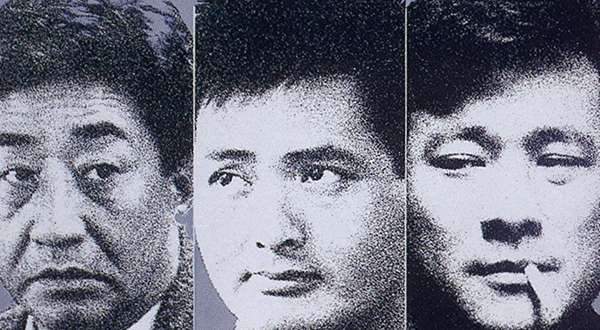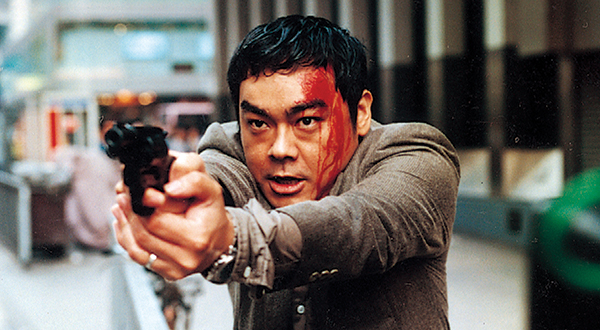Summer is officially here, which means New York City is going to get painfully hot and humid (and smelly) real quick. But your best bet to beat the heat (unless you feel like holing yourself in your apartment with AC cranked up; have fun dealing with that big ass Con Ed bill in a few weeks) is also here. I’m talking about the 2015 New York Asian Film Festival of course!
It’s the 14th year for the NYAFF, and once again, I’ll be your tour guide. This time I’ll be offering alternative ways to blow $15 instead of Terminator 5. Now, admittedly, the idea of a T-800 being Sarah Connor’s dad is a kinda cool, but … you can catch that later on, via Netflix. Whereas most movies at the NYAFF will not be easy to come by after the fact. Along with how a good percentage will also legit blow your mind. So what’s up first?
City On Fire

Easily the biggest name to grace this year’s NYAFF, and perhaps one of the biggest the festival has ever received period, is Ringo Lam. Alongside John Woo and Tsui Hark, Ringo Lam is responsible for revitalizing Hong Kong cinema circa the 80s; the three established what has been coined the heroic bloodshed genre (Jackie Chan played a major part as well, though by being the first bonafide martial arts superstar since Bruce Lee). Also, much like Woo and Hark, Lam would eventually migrate to Hollywood and make shi*tty Van Damme vehicles. Anyway, Lam’s Lifetime Achievement Award presentation will accompany the screening of the one flick he’s most famous for. Not because it helped to usher in the aforementioned boom, alongside A Better Tomorrow. No, you’ve probably heard of City on Fire as the movie that Quentin Tarantino’s drew a inspiration from when crafting his breakthrough feature, Reservoir Dogs, by shamelessly ripping it off…
Admittedly I’m as big a Tarantino fanboy/defender as they come: he’s a legit inspiration to me, with Reservoir Dogs being my all time fave from the man. Yet I’m a hopeless Asian cinephile as well, the kind who refuses to believe that The Departed could in any way be as good as Infernal Affairs. Another example, one more relevant to the discussion at hand; I also simply cannot view The Matrix as being anything more than just a bunch of ideas cherry-picked from assorted HK movies, and in the laziest manner possible. Yet I’m confident that those most vocal about Reservoir Dogs ripping off City on Fire have never actually seen the latter. Granted, one mirrors the other to a considerably degree, but there is no blatant copycatting going on. Tarantino’s film distinguishes itself with a non-linear narrative, whereas Lam’s legit wrote the book on how to make a movie on undercover cops who become lost in their work that’s taught in Hong Kong film schools.
Reservoir Dogs’s Mr. Orange, portrayed by Tim Roth, is based upon City on Fire’s Chow, portrayed by Chow Yun-Fat (his character’s name is the same as it is real life, which is common for leads in HK flicks, and yes it’s super silly). Though here we’re privy to a far more in-depth look at the price one must pay to be an undercover, hence why Chow’s retired at the onset. Enter Uncle Kung, a police inspector desperate to take down a gang of brutally violent jewel robbers. Alas, his experience means little to those rising up the ranks, who have zero respect for their elders, hence the need for a new inside man (to replace the last undercover, who was just sniffed out and snuffed). Chow initially wants nothing to do with the case; aside from the hardship that simply comes with leading a double life, along with constantly being hunted down by cops (even though he’s on their side), Chow became super close with his last assignment. Despite justice being ultimately served by the death of public enemy number one, it’s still the loss of a close pal, one that haunts Chow well afterward.
But upon seeing what a mess Uncle Kung is becoming, Chow reluctantly gives in and eventually becomes acquainted with head jewel robber Fu, portrayed by Danny Lee. It’s worth noting that both the star and co-star of City on Fire would eventually headline John Woo’s The Killer, with the roles of so “good guy” and “bad guy” reversed. It’s also worth noting that the vetting Chow must go through, to prove he’s legit, is decidedly more nerve racking than the Mr. Orange’s commode story. Yet that makes the bond that forms between Chow and Fu all the closer. Again, per conventions of the genre that this film helped to cement, Chow’s biggest headache is the law, who are to largely blame for him being unsuccessful in reconciling with his estranged gal pal, which was his primary focus at the start of the film (and perhaps the reason why he quit the force in the first place). The fact that Fu has had Chow’s back the most makes the eventual betrayal so impactful, since the relationship between the two is way more defined than the one between Mr. Orange and Mr. White. Does that make City on Fire the better movie then? Not exactly, but once more, they’re two entirely different animals.
Each and every serious Quentin Tarantino fan reading this needs to absolutely see City on Fire, which plays Saturday, June 27, at the Walter Reade Theater (get your tickets here); don’t forget Ringo Lam will be in attendance that night as well! It’s again a must see for anyone who wants to see such an influential piece of work in the annals of Hong Kong cinema as well. While you’re at it, you may also want to check out…
Full Alert

Ringo Lam’s output, post City on Fire, is somewhat a mixed bag. Prison on Fire came next, followed by several other movies with on Fire in the title; none were related, yet all were fairly successful. Lam also collaborated with various HK film luminaries, including Sammo Hung and Jackie Chan, though he’d mostly stick with Chow Yun-fat as his go-to leading man. Still, by the mid 90s, Lam found difficulty connecting with critics and the general public alike (that’s not to say his movies were not very good, btw, just not what some were hoping for), hence why he’d try his luck elsewhere and eventually ended up in Hollywood. As previous noted, that resulted in a Jean-Claude Van Damme production, as was the case with pretty much every HK auteur. In 1997 Lam returned to Hong Kong, ten years after making his most famous movie (it’s also an important year for reason I’ll get into later, though anyone who knows HK history knows why already). And whereas City on Fire firmly established the ground rules for all cop vs robbers melodrama and action for other directors to follow, Full Alert sees Lam taking a page out of the new and updated playbook, written by those he inspired, while also offering a few pointers to boot.
Lau Ching-Wan gets top billing here as police officer Pao (and is the perfect choice, given how he was the only actor to truly fill Chow Yun-fat’s shoes across the annals of HK cinema). Though it could be argued that the real star of the show is Francis Ng as Mak Kwan, whose muted intensity is perfectly suited as a bitter ex-architect who knows a thing or two about explosives (the dude is simply the best when it comes to quiet but deadly). Pao’s men initially apprehend Mak Kwan for murder, but they quickly realize something else is afoot when materials for making a bomb and blueprints to a vault are stumbled upon. Unable to get anything out of Mak Kwan, the police let his girlfriend go in hopes of her leading them to her man’s partners in crime. Eventually the cops discover a plan to spring Mak Kwan out, and while ultimately unsuccessful in thwarting his associates, another officer is killed in the line of duty, and thus we get the slow but steady unraveling of the captain of the ship. At work the already temperamental officer barks at his colleagues for no good reason and at home he tells his wife that maybe he’s not cut to be a cop anymore. Yeah, fairly by the numbers stuff, on paper at least; it’s all in the execution, and the reason why Lau Ching-Wan is such a celebrated actor is he can take a character that’s seemingly two-dimensional and breath real life into him. Even the stuff that’s designed to make a two-dimensional character seem three-dimensional, yet only serves to make the audience roll their eyes, totally works here (though Lam deserves equal credit as well).
City on Fire established the super popular trope in HK cinema of blurring the lines between good guys and bad, by having the criminal display just as much honor and nobility as those who uphold the law, often resulting in the cop identifying with (and sometimes aiding) the criminal he’s supposed to be taking down. By the time Full Alert is made, a brand new trope had been firmly established, in which we see the cop and criminal as possible kindred spirits, but in the end is the grim reminder that right is right and wrong is wrong. In this instance, Mak Kwan eventually flees prison and gets in a scuffle with Pao in the middle of downtown; Pao takes a desperate shot at Mak Kwan and accidentally hits a bystander. Afterward Mak Kwan calls Pao to make sure the innocent person is okay, which makes one go “you know, maybe he’s not such a bad guy after all!” We also get the requisite commentary from Mak Kwan that, perhaps in a different world, he and Pao would be besties. And then does something stupid, like terrorize Pao’s wife and kid. The film culminates with Mak Kwan and his lone remaining associate’s attempt at cracking the vault at a race track, hence the incendiary device and schematics from before. In the midst of it all we witness Pao exhibit a personality quirk (which I’m not going to give away) so teeny-tiny and ultimately inconsequential, yet it adds so much character to the proceedings. To the degree that it’ll hit you on the head why Lau Ching-Wan is such a phenomenal actor, as well as make you wonder why Ringo Lam’s name isn’t spoken more often when Hong Kong’s cinematic giants are discussed.
Am pretty sure I’ve done a piss poor job selling Full Alert, but it’s another absolute must see, from a director who may not be as flashy or bombastic as John Woo, yet knows how to tell a story in a rock solid, no f*cking around manner. It’ll also an excellent reminder of how God awful most movies hailing from Hollywood are these days, which is the job of the NYAFF as a whole. Then again… tinsel town didn’t always suck; back in the 70s and 80s, some genuinely amazing motion pictures were being produced. The same could be said about the Hong Kong movie-making machine in the 80s and 90s. Things kinda changed in 1997, thanks to the UK handing HK over to China. Things didn’t completely crash and burn, like some predicted, but things did change. And some… myself included, to a certain extent… are not particularly fond of what’s hailing from HK these days. But I’ll get into all that at another time. Tomorrow to be exact. Till then, be sure to catch Full Alert this Sunday, June 28, at the Walter Reade Theatre (get your tickets here).
